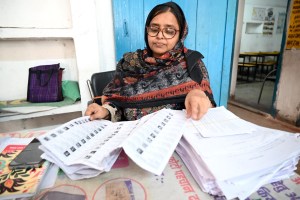Stay updated with the latest - Click here to follow us on Instagram
In GST laws ratification, Punjab sees an opportunity to get pending bills cleared
The Bills have been pending with Purohit, who had refused to acknowledge the special session of the Punjab Assembly, calling it “patently illegal” and had said the Budget Session was not prorogued.
 The AAP-led government tabled the four Bills during the special session and sent them to Purohit for his approval. (Express File Photo by Jasbir Malhi)
The AAP-led government tabled the four Bills during the special session and sent them to Purohit for his approval. (Express File Photo by Jasbir Malhi) With the Centre asking state governments to approve changes to their respective Goods and Services Tax (GST) laws by October 1 to enable the setting up of an appellate tribunal with its principal bench in Delhi, it may provide an opportunity for Punjab to get four Bills, awaiting assent from Governor Banwarilal Purohit, approved.
The Bills have been pending with Purohit, who had refused to acknowledge the special session of the Punjab Assembly, calling it “patently illegal” and had said the Budget Session was not prorogued. If the Budget Session was not prorogued then the special session, convened on June 19 and 20, could only be termed an extension of the Budget Session and only budget-related business could be taken up in the special session.
However, the AAP-led government tabled the four Bills during the special session and sent them to Purohit for his approval. Those included The Punjab Police (Amendment) Bill, 2023, and the Sikh Gurdwaras (Amendment) Bill, 2023. The government had also sent the controversial Punjab University Laws (Amendment) Bill, 2023, removing the Governor as the chancellor of state universities, whose legal sanctity was questioned by Purohit later.
The Governor did not give his assent to these Bills, saying the special session held by the government was illegal and Bills passed during such a session need not be taken up by him.
However, the requirement of the Centre for states’ ratification of the GST Act has provided a window of opportunity for the state which has still not got the Budget session prorogued.
“Since the session is not prorogued and is still ongoing, the state government cannot pass an ordinance in the Cabinet for the GST appellate tribunal. If it takes the Vidhan Sabha route, then the ball will be in the court of the Governor. Since it is the Centre’s requirement, the Governor may allow the ratification, thereby acknowledging the special session. In the process, our Bills could also get the Governor’s approval,” said a government functionary.
Amid the confrontation, the Governor has not prorogued the session. Once the session is adjourned sine die, the government sends the communication to the Governor to get it prorogued. Once that is done, the government has to get the Governor’s permission to call the next session.
However, amid the ongoing tussle with the Governor, it suited the government not to get the session prorogued.
During an interview with The Indian Express, the Governor had said, “They adjourned the session sine die but did not get it prorogued as they have to take permission (from the Governor) to call a session every time. So, they found a shortcut. They did not get the session prorogued and kept it ongoing. In this case, only the Speaker’s permission is required. The Budget session was adjourned. Then the Monsoon Session was to be called”.
“For this, they had to come to me. So, they did not want to get the Budget session prorogued. (When they called the special session) I wrote to them asking them about the agenda. Then they wrote that the Business Advisory Committee will decide the agenda. If the session was adjourned, then only those items were to be taken up which could not be discussed in the Budget Session. I wrote to them that this (session) is illegal. But they summoned the session without an agenda, and passed four Bills also the same day, without prior circulation and any discussion. So, I took legal advice and I was told that the session was ‘patently illegal’,” the Governor had said.
Parliament had given its nod to changes in the GST laws in March. With the states ratifying the GST Act, providing for the tribunal, it will have benches across states by December.
The delay in the establishment of the appellate tribunal has led to the accumulation of unresolved legal issues under the GST regime after it was rolled out in July 2017.
Currently, taxpayers are filing writ petitions in high courts in the absence of an appellate tribunal. So, the establishment of an appellate tribunal will lower the burden on high courts and the Supreme Court analysts said.







